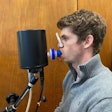
An international study out of Australia has found that specialized online singing programs can significantly improve the quality of life for people living with chronic lung diseases such as chronic obstructive pulmonary disease (COPD) and interstitial lung disease (ILD).
Researchers from Monash University in Melbourne and the University of Cambridge in England announced phase 3 results from the continuation of the SINFONIA study. Their results were presented at the European Respiratory Society (ERS) Congress 2025 in Amsterdam. The study evaluated the impact of a 12-week guided, online group singing intervention compared to usual care for participants with COPD or ILD.
The 101 participants in the singing group scored 7.4 points higher on the SF36 quality-of-life scale than those in the control group — a statistically significant improvement. Those who attended at least eight sessions saw even greater benefits, with an 11-point increase, surpassing the threshold for clinical significance.
“Currently, the main approach clinicians offer to patients for symptom management is pulmonary rehabilitation,” said Natasha Smallwood, PhD, professor and director of respiratory medicine at Alfred Health and Monash University, in Healio. “Research demonstrates that very few people who are eligible for pulmonary rehabilitation ever complete a program, as there are many barriers to participation.”
The study also found that the singing intervention was especially effective for:
- Women with an average treatment effect (ATE) of 8.1
- Individuals with anxiety or depression (ATE 18.4)
- Those who had not previously undergone pulmonary rehabilitation (ATE 10.5)
No adverse events were reported, and although secondary outcomes such as anxiety, depression, dyspnea and loneliness did not show statistically significant changes, the overall improvement in quality of life highlights the potential of nonpharmacological, arts-based therapies in respiratory care.
“Our results build on growing evidence that singing may help relieve symptoms and improve quality of life for people with severe chronic lung disease,” Dr. Smallwood said.
The findings were presented at the session, “ALERT 2: Infections, Lung Cancer and Respiratory Symptoms Management,” at the European Respiratory Society (ERS) Congress 2025 in Amsterdam.























